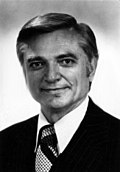New South governors
Ascended to office through death or resignation of incumbent governor
| Governor | Party | State | Term | Notes | ||||
|---|---|---|---|---|---|---|---|---|
| Start | End | Length of service | ||||||
 | Terry Sanford | Democratic | North Carolina | January 5, 1961 | January 8, 1965 | 4 years, 3 days | Later served as U.S. Senator from 1986 to 1993. [6] [7] | |
 | Carl Sanders | Democratic | Georgia | January 14, 1963 | January 10, 1967 | 3 years, 361 days | [8] | |
 | Albert Brewer | Democratic | Alabama | May 7, 1968 | January 18, 1971 | 2 years, 256 days | [1] | |
 | Reubin Askew | Democratic | Florida | January 5, 1971 | January 2, 1979 | 7 years, 362 days | [1] | |
 | Dale Bumpers | Democratic | Arkansas | January 12, 1971 | January 3, 1975 | 3 years, 356 days | Later served as U.S. Senator from 1975 to 1999. [1] | |
 | Jimmy Carter | Democratic | Georgia | January 12, 1971 | January 14, 1975 | 4 years, 2 days | Later served as President of the United States from 1977 to 1981. [1] | |
 | John C. West | Democratic | South Carolina | January 19, 1971 | January 21, 1975 | 4 years, 2 days | [1] | |
 | Bill Waller | Democratic | Mississippi | January 18, 1972 | January 20, 1976 | 4 years, 2 days | [12] | |
 | James Holshouser | Republican | North Carolina | January 5, 1973 | January 8, 1977 | 4 years, 3 days | [1] | |
 | David Pryor | Democratic | Arkansas | January 14, 1975 | January 3, 1979 | 3 years, 354 days | Later served as U.S. Senator from 1979 to 1997. [1] | |
 | George Busbee | Democratic | Georgia | January 14, 1975 | January 11, 1983 | 7 years, 362 days | [1] | |
 | Cliff Finch | Democratic | Mississippi | January 20, 1976 | January 22, 1980 | 4 years, 2 days | [13] | |
 | Jim Hunt | Democratic | North Carolina | January 8, 1977 January 9, 1993 | January 5, 1985 January 6, 2001 | 15 years, 364 days | [12] | |
 | Bob Graham | Democratic | Florida | January 2, 1979 | January 3, 1987 | 8 years, 1 day | Later served as U.S. Senator from 1987 to 2005. [1] | |
 | Bill Clinton | Democratic | Arkansas | January 9, 1979 January 11, 1983 | January 19, 1981 December 22, 1992 | 11 years, 356 days | Later served as President of the United States from 1993 to 2001. [1] | |
 | Richard Riley | Democratic | South Carolina | January 10, 1979 | January 14, 1987 | 8 years, 4 days | [1] | |
 | Lamar Alexander | Republican | Tennessee | January 20, 1979 | January 17, 1987 | 7 years, 362 days | Later served as U.S. Senator from 2003 to 2021. [1] | |
 | William F. Winter | Democratic | Mississippi | January 22, 1980 | January 10, 1984 | 3 years, 353 days | [1] | |
 | Dave Treen | Republican | Louisiana | March 10, 1980 | March 12, 1984 | 4 years, 2 days | [1] | |
 | Chuck Robb | Democratic | Virginia | January 16, 1982 | January 18, 1986 | 4 years, 2 days | Later served as U.S. Senator from 1989 to 2001. [1] | |
 | James G. Martin | Republican | North Carolina | January 5, 1985 | January 9, 1993 | 8 years, 4 days | [1] | |